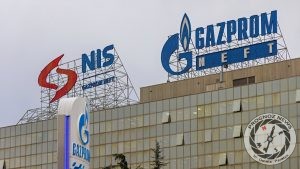The effect of US Russia sanctions upon Serbia

By Matthew Parish, Associate Editor
On 22 October 2025 the US administration designated Russia’s two largest oil companies, Rosneft and Lukoil, under its sanctions regime — freezing their assets in US jurisdictions, barring US persons from dealing with them, and warning that others transacting with them risk secondary sanctions. The following day the European Union adopted its 19th sanctions package, which similarly targeted the Russian energy sector including Rosneft and its affiliates.
These measures are part of a broader push by the US, the EU and their allies to reduce Russia’s export revenues from hydrocarbons and thereby degrade her capacity to finance the war in Ukraine.
Serbia is heavily exposed to Russian energy: her main oil refinery and fuel distribution company, Naftna Industrija Srbije (“NIS”), is majority-owned by Russian interests (Gazpromneft and Gazprom). That means Serbia depends to a large degree on Russian crude, refining capacity and fuel supply. The sanctions on Rosneft/Lukoil are therefore indirectly relevant to Serbia’s energy security and economic stability.
Fuel supply and refining risks
Although the Rosneft/Lukoil sanctions are targeted at the Russian companies, their ripple effects reach Serbia. One immediate consequence is the heightened risk of disruptions in crude-oil delivery and increased cost for fuel imports. Reports indicate that shipments destined for Serbia’s refinery were blocked or delayed after earlier Russian-linked sanctions on NIS, and the Rosneft/Lukoil measures exacerbate that risk.
For Serbia this matters because production disruption in NIS would impact both domestic supply of petrol, diesel and heating oil, and could force imports of finished products at higher cost. That in turn raises inflationary pressure, burdens households, and weakens the economic situation ahead of winter.
Increased cost and fiscal burdens
With the major Russian upstream players under sanction, their downstream partners and affiliates face greater risk, higher financing and logistical costs (in particular insurance and shipping). For Serbia this means that NIS and other firms linked via Russian ownership may face higher borrowing costs, reduced access to Western capital, difficulties in ordering spare parts or services, or delays in investment. That in turn can hurt profitability, slow investment in refinery upgrades, and reduce NIS’s contribution to the Serbian state budget (either via taxes, dividends or employment).
Moreover the discount pressure on Russian crude (and the need to redirect supplies, potentially via longer and costlier routes) may raise the effective input cost for NIS and thereby raise fuel prices domestically. The state may face pressure to compensate or subsidise, which burdens the fiscal position.
Investor and market confidence
From a market perspective, Serbia’s exposure to Russian-owned energy firms under sanctions raises investor uncertainty. Foreign investment is likely to decline if counterparties fear secondary sanctions, or if banks are reluctant to finance projects tied to Russian energy ownership. This slows Serbia’s wider energy sector reform and infrastructure modernisation, which is crucial for her EU-accession path. In effect, Serbia’s energy economy becomes more risky.
Foreign-policy alignment tensions
The sanctions on Rosneft and Lukoil place Serbia in a more precarious foreign-policy position. On one side, Serbia traditionally maintains close ties to Russia—both politically and in the energy sphere. On the other side, Serbia aspires to join the EU and to deepen ties with the West, which now expects alignment with sanction regimes. The new US/EU sanctions intensify the pressure on Belgrade to choose: maintain the Russian energy relationship at cost of Western friction, or pivot more decisively toward the West at cost of energy vulnerability.
Third-country states whose refineries process Russian crude are now in “the sanction cross-hairs”. Serbia is precisely that case.
Belgrade’s choices matter: failure to align may delay EU accession or invite secondary sanctions risk; too strong a pivot may provoke Russian retaliation (for example via cut-offs of supply). Politically, this raises the stakes for the government of President Aleksandar Vučić which must navigate between Russian ties and Western demands.
Domestic legitimacy and social risk
Fuel supply disruption, rising prices or energy insecurity may become a domestic fault‐line. If the Serbian public perceives that fuel shortages or higher energy costs are a consequence of government choices (or of failure to manage the Russian link) then the political cost could be significant Already, reports warn that the NIS refinery could face shutdown, which the government must avoid at all costs.
The confluence of sanctions + energy exposure = potential domestic instability, especially as winter approaches and heating oil is critical. Belgrade must balance technical energy management with political messaging to avoid loss of credibility and public unrest.
Leverage and dependency dynamics
The sanctions indirectly shift the leverage dynamic in the region. Russia’s ability to use Serbia’s energy dependency as a tool of influence is weakened if Russian majors face sanction-driven erosion of capacity or ownership. Conversely, Serbia’s dependency becomes a strategic vulnerability: if Russian companies divest, reduce investment or supply, Serbia must find alternatives under pressure and quickly — otherwise she is exposed to external energy coercion or supply shocks.
Thus Serbia may find herself forced into faster diversification of energy sources (but that is costly and time-consuming), or into increased obligation to Western institutions for investment and infrastructure support (which brings its own political cost).
Accelerated energy-sector reform and diversification
Given the heightened risk, a rational response for Serbia is to accelerate energy-sector reform: diversify import routes (non-Russian crude, alternative pipelines), reduce reliance on Russian-owned firms, restructure the refining/retail sector, and increase storage/resilience.
However reform means investment, regulatory change and possibly breaking long-standing ownership models (such as NIS’s Russian majority share). The sanctions on Rosneft/Lukoil make this reform more urgent but also more challenging (because Russian firms may exit, assets may be sold, transitional risk is high).
Serbia may therefore face a moment of choice: maintain the status quo under rising risk, or engage in costly restructuring now for longer-term resilience.
EU accession and Western integration calculus
From a strategic standpoint, Serbia’s choices now will reverberate through its EU accession path and its Western economic integration. The sanctions send a clear signal that the West expects its candidate/aspiring states not to remain tied to sanctioned Russian energy assets. Serbia’s continued dependence may slow her accession, invite greater scrutiny, or require concessions (such as aligning fully with sanctions, which Serbia has resisted in some instances so far).
Conversely Serbia could use this as an opportunity: by actively dis-associating from Russian energy ownership (for example seeking Western investment in NIS or alternative supply), Belgrade could accelerate its alignment with the West and thereby strengthen its negotiation position in the accession process. Ultimately this choice of direction will be for President Vučić to take, and promptly.
Domestic political realignment and ownership transformation
The Russia sanctions might catalyse a domestic political and ownership transformation. If Russian firms (via Lukoil, Rosneft or others) reduce or withdraw from Serbian energy assets (either voluntarily or under pressure), then Serbia will face decisions about nationalisation, sale to third-party investors or restructuring of firms. That inevitably has political consequences: debate over national interest, public ownership, foreign investment and transparency, in a country whose transparency standards have not always been impeccable. The government must manage this transition to avoid loss of employment, investor confidence, or public backlash.
Indeed recent reporting indicates that the Russian stakeholders in NIS have already opened talks about exit, given the pressure of sanctions. For Serbia this means the “Russian-owned energy backbone” may become more grey and contested. If Russia withdraws, Serbia may have no choice but to go to the West and seek credit and investment to replace the Russian vacuum.
The sanctions imposed by the United States on Rosneft and Lukoil on 22-23 October 2025 carry significant consequences for Serbia—both economically and politically. Economically they amplify risk to Serbia’s energy supply chain, increase operational and investment costs for Russian-owned firms in Serbia, and heighten fiscal and inflationary pressures for the Serbian state and consumers. Politically, they intensify Serbia’s foreign-policy dilemma between Russia and the West, raise legitimacy risks at home if energy supply or prices falter, and place Serbia’s energy dependency in sharper relief as a strategic vulnerability.
In the medium term Serbia faces a strategic decision point: either preserve the existing Russian-tied energy model at increasing risk, or undertake a painful but potentially beneficial transition toward diversified supply, Western-aligned investment and structural reform of her energy sector. The sanctions on Rosneft/Lukoil are not just about Russia’s economy—they are indirectly a structural test for Serbia’s energy sovereignty, her foreign-policy orientation, and its domestic political stability.
98 Views










